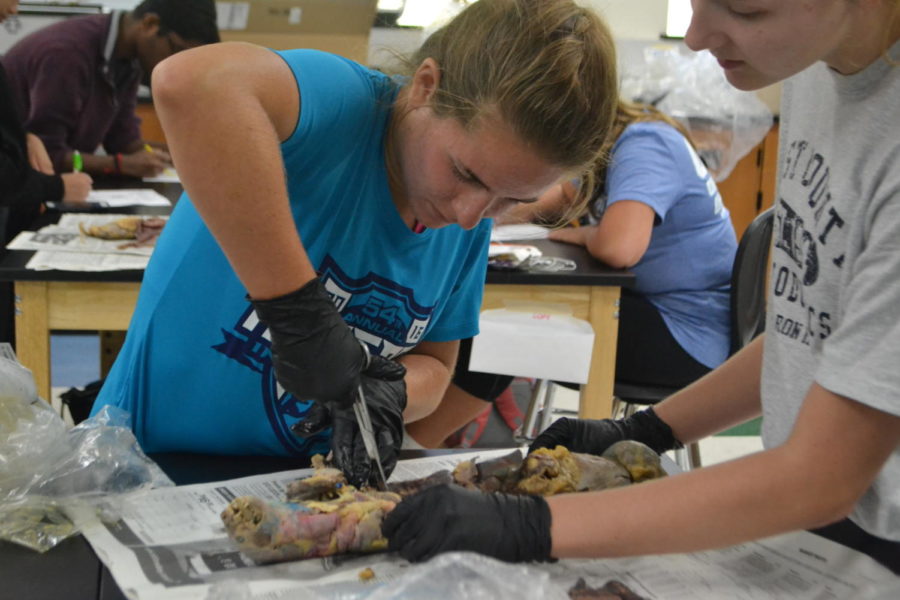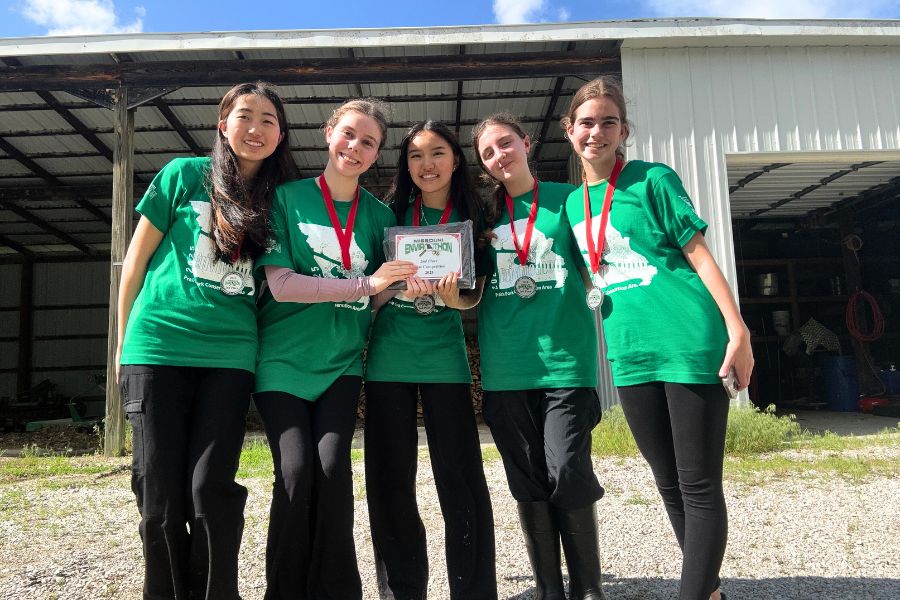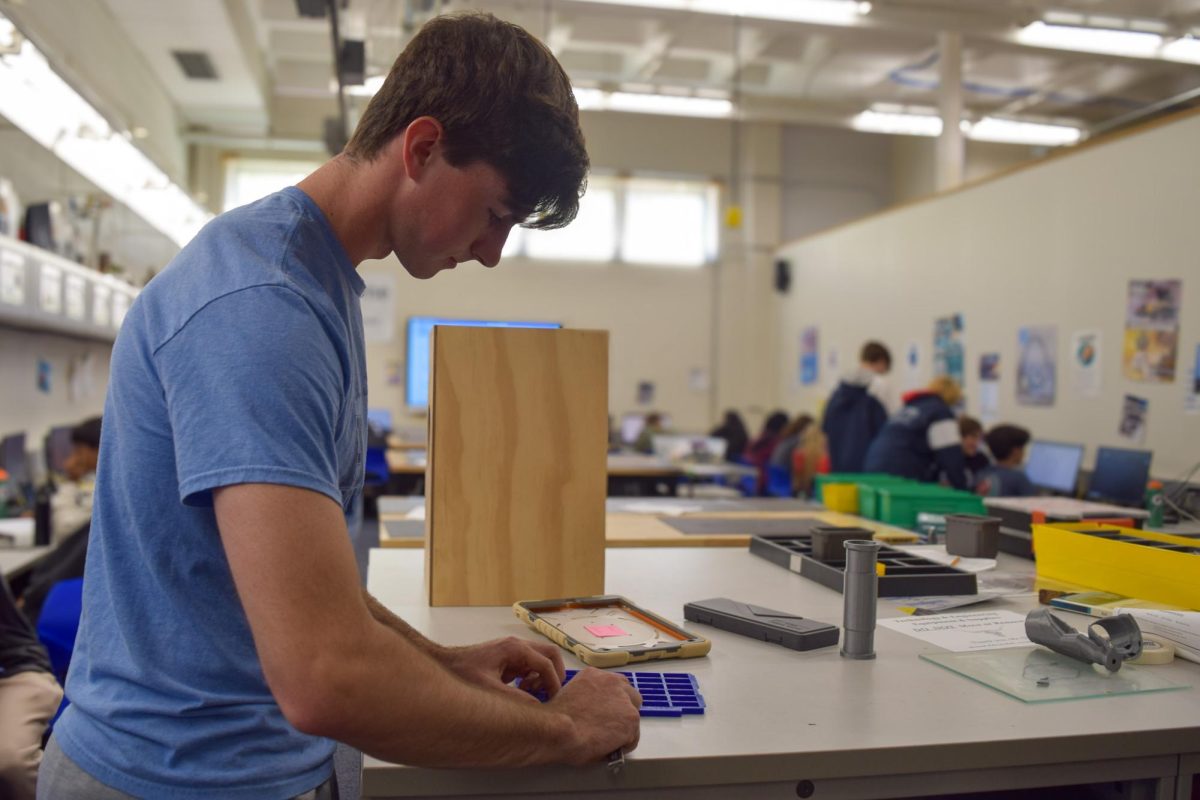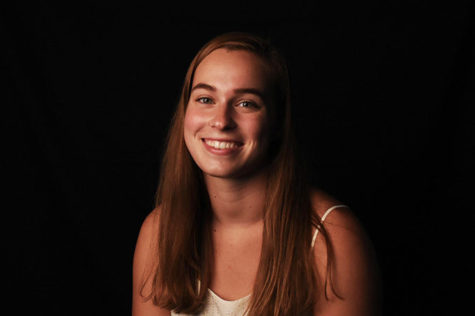Junior Audrey Heathcote participates in Saturday Scholars, a program hosted by Washington University (Wash U) in St. Louis in which selected high school students learn about the medical field through lectures and hands-on experiences in the cadaver lab every Saturday for five weeks.
Heathcote first learned of Saturday Scholars at the Health Professions Fair in January where there were multiple booths set up with various medical field workers. Science teacher Charlie Cutelli took eight of his Human Anatomy and Physiology students, including Heathcote.
“Audrey is inquisitive. She is not afraid to get her hands dirty, ask questions and learn for the sake of learning and not points,” Cutelli said. “These [qualities] will go far in her schooling and prep for the world of medicine.”
Heathcote is the only student from West who applied to be a part of Saturday Scholars. The application process required a short essay on a booth at the fair, and there were about 50 students selected from the area.
“What really got me to apply was the cadaver lab,” Heathcote said. “[I was really looking forward to] holding all of the organs because you see pictures in textbooks, but it is so much different to actually hold a heart and see the aorta and feel it. It made me understand it more.”
During the Saturday sessions, participants listened to a lecture from Wash U medical students. Each week covered a different body system: cardiovascular, respiratory, digestive, renal and reproductive.
“I had read about the [cardiovascular system] before so [that lecture] wasn’t so difficult for me,” Heathcote said. “But, oh my gosh, the kidneys. They’re so complicated. It’s kind of amazing.”
Following the lecture, the students were allowed to visit Wash U’s cadaver lab where they observed different bodies and held organs that exhibited defects and causes of death relating to the lecture that day.
“Learning about it [in a textbook] is one thing, but seeing and feeling it is something completely different,” Heathcote said. “They [textbook authors] usually have [organs] in a nice, color-coded model, but it’s not like that in real life.”
Heathcote feels that Saturday Scholars was a unique opportunity that gave her a preview of the next chapter of her life.
“[One thing I learned was] how hard medical school is going to be,” Heathcote said. “The lectures weren’t watered down. [The lectures in college are] in-depth, and it’s really overwhelming.”
Despite the challenging lectures, Heathcote’s experience in the cadaver lab solidified her belief that she wants to be a surgeon in her adult life.
“I expected [going to the cadaver lab] would hit me more, but I didn’t get sad or freaked out,” Heathcote said.
Heathcote is grateful to have had the chance to get some experience in what she hopes will be her career.
“It is so much easier to realize that something that you thought was right for you isn’t right for you in high school than it is once you’ve paid thousands of dollars [for college],” Heathcote said. “I’m excited now because I know I’ll be able to [be a surgeon].”



![Focused on providing exceptional service, sophomore Darsh Mahapatra carefully cleans the door of a customer’s car. Mahapatra has always believed his customers deserve nothing less than the best. “[If] they’re trusting us with their car and our service, then I am convinced that they deserve our 100 percent effort and beyond,” Mahapatra said.](https://pwestpathfinder.com/wp-content/uploads/2025/10/DSC_0018-1200x800.jpg)
![Sophomore Aleix Pi de Cabanyes Navarro (left) finishes up a soccer game while junior Ava Muench (right) warms up for cross country practice. The two came to Parkway West High School as exchange students for the 2025-2026 school year. “The goal for the [exchange] program is to provide opportunities for both Parkway students and our international exchange students to learn about other cultures, build connections and become confident, capable, curious and caring — Parkway’s Four C’s — in the process,” Exchange Program Lead Lauren Farrelly said.](https://pwestpathfinder.com/wp-content/uploads/2025/10/Feature-Photo-1200x800.png)

![Gazing across the stage, sophomore Alexis Monteleone performs in the school theater. The Monteleone family’s band “Monte and the Machine” has been releasing music since 2012, but Alexis started her own solo career in 2024 with the release of her first single, Crying Skies. “My whole family is very musical, [and I especially] love writing [songs with them],” Monteleone said.](https://pwestpathfinder.com/wp-content/uploads/2025/09/DSC7463-1200x798.jpg)
![Amid teaching a lesson to her AP Calculus BC class, Kristin Judd jokes alongside her students in their funny remarks. Judd has always enjoyed keeping the mood light in her classroom, along with on the volleyball court. “[I enjoy] that side talk where you see [or] overhear a conversation and chime in, or somebody says something funny,” Judd said.](https://pwestpathfinder.com/wp-content/uploads/2025/09/image-1200x730.jpg)
![Eyeing the ball, junior Ella McNeal poses for her commitment pictures at Clemson University. McNeal’s commitment comes after months of contact with top Division 1 soccer programs. “ It has taken a lot to get to where I am, but I know that [what] I've already been through is just the beginning, and I can't wait for what is to come,” McNeal said.](https://pwestpathfinder.com/wp-content/uploads/2025/09/IMG_4926-1200x900.jpeg)


![Senior Adam Zerega stands with senior Dexter Brooks by farm equipment. Zerega often worked with friends and family on his farm. “I've been able to go to my family's farm since I was born. I [spend] at least three weekends a month [on the farm], so I'm there all the time,” Zerega said.](https://pwestpathfinder.com/wp-content/uploads/2025/04/IMG_4872-1200x900.jpg)

![After a thrilling point, senior Katie Byergo and junior Elle Lanferseick high-five each other on Oct. 8. With teamwork and camaraderie, Byergo worked together in the game against Lafayette High School. “[Byergo’s] is really positive with a good spirit,” Lanferseick said. “I set her [the ball] and she hits it [or] gets the kill.”](https://pwestpathfinder.com/wp-content/uploads/2025/10/DSC_9349-1-e1761159125735-1200x791.jpg)
![Leaning on the podium, superintendent Melissa Schneider speaks to Parkway journalism students during a press conference. Schneider joined Parkway in July after working in the Thompson School District in Colorado. “My plan [to bond with students] is to get things on my calendar as much as possible. For example, being in [classes] is very special to me. I am trying to be opportunistic [meeting] kids [and] being in [the school] buildings. I have all the sports schedules and the fine arts schedules on my calendar, so that when I'm available, I can get to them,” Schneider said.](https://pwestpathfinder.com/wp-content/uploads/2025/09/IMG_5425-1200x943.jpeg)

![Leaping through the air, senior Tyler Watts celebrates his first goal of the season, which put the Longhorns up 1-0 against the Lafayette Lancers. Watts decided to play soccer for West for his last year of high school and secured a spot on the varsity roster. “[Playing soccer for West] is something I had always dreamed of, but hadn’t really had a good opportunity to do until now. It’s [really] fun being out [on the field], and I’m glad I decided to join the team. It’s just all about having fun with the boys and enjoying what time we have left together,” Watts said.](https://pwestpathfinder.com/wp-content/uploads/2025/09/DSC_1951-1200x855.jpg)

![Shifting global trade, President Donald Trump’s tariffs are raising concerns about economic stability for the U.S. and other countries alike. “[The tariffs are] going to pose a distinct challenge to the U.S. economy and a challenge to the global economy on the whole because it's going to greatly upset who trades with who and where resources and products are going to come from,” social studies teacher Melvin Trotier said.](https://pwestpathfinder.com/wp-content/uploads/2025/05/MDB_3456-1200x800.jpg)

![Pitching the ball on Apr. 14, senior Henry Wild and his team play against Belleville East. Wild was named scholar athlete of the year by St. Louis Post-Dispatch after maintaining a high cumulative GPA and staying involved with athletics for all of high school. “It’s an amazing honor. I feel very blessed to have the opportunity to represent my school [and] what [it] stands for,” Wild said.](https://pwestpathfinder.com/wp-content/uploads/2025/05/unnamed-6-1200x714.jpg)
![Red, white and blue, the American flag holds the values of our democracy. The fight that we once endured has returned, as student journalists and senior correspondents across the country are losing their voices due to government control. “[Are] the White House and [the] government limiting free speech [and] freedom of the press? Yes [they are],” chief communications officer of the Parkway School District and former journalist Elisa Tomich said.](https://pwestpathfinder.com/wp-content/uploads/2025/03/Untitled-design-14.jpg)
![Freezing in their position, the Addams Family cast hits the “rigor mortis” pose after cast member and senior Jack Mullen, in character as Gomez Addams, calls out the stiff death move. For the past four months, the combined company of cast members, orchestra pit, crew and directors all worked to create the familial chemistry of the show. “I’m excited for [the audience] to see the numbers, the music, the scenes, but I also just love all the technical aspects of it. The whole spectacle, the costumes, makeup and the people that put in the work backstage in order to make the show successful on stage. I’m excited for people to see and appreciate that,” Mullen said.](https://pwestpathfinder.com/wp-content/uploads/2025/03/DSC0116-1200x800.jpg)

Thalia Stein • Apr 30, 2018 at 10:34 pm
What exactly is a minx, and where do you get this animal in the numbers required for for students to learn on. How and why did you choose this specific animal?